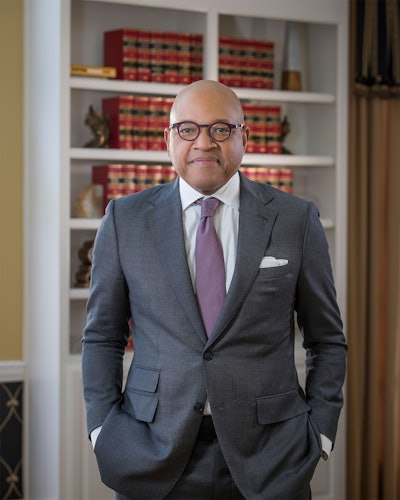 Dr. David Thomas
Dr. David Thomas
When he took the reins of the men-only historically Black college in 2018, the institution was still struggling with declining enrollment that began with the 2008 recession. Thomas says the recession drove down enrollment from about 2,700 students then to about 1,700 when he arrived. And the college didn’t have much money for its rainy-day fund.
“We had little to no unrestricted reserves, which meant we didn’t have enough money to run the college for a year if the economy fell apart on us,” Thomas says during a recent phone interview with Diverse.
“Today, that’s reversed,” he says. “Our liquidity is great. We could run the college for almost two years just on our unrestricted reserves and quasi endowment. We’ve doubled our endowment,” he says, adding that the endowment grew from $127 million in 2018 to $285 million today.
“I’m most proud of the fact that we moved the college from a precarious financial position to a very solid one,” Thomas says.
As for student enrollment, in 2023 it stood at over 2,738, federal data show. Thomas is also proud of the fundraising success that the college has enjoyed during his presidency, which will end when he retires in June.
“In the last seven years we’ve raised $330 million,” Thomas says. “And most of that has gone toward student scholarships and affordability.
“A good chunk has also gone toward campus infrastructure,” Thomas says, rattling off a list of construction or infrastructure projects, such as a new residence hall that will house more than 300 students, a new 58,000-square-foot campus center, and doing about $20 million in deferred maintenance.
But more money in the bank and more students on campus is just part of the story. Thomas says Morehouse has also increased its graduation rates. The graduation rate currently stands at 54% – just four percentage points shy of the 58% midpoint for four-year schools – according to The College Scorecard, whereas Thomas says the four-year graduation rate was less than 37% when he arrived.
Morehouse has also become more selective about who it admits, Thomas says, mentioning figures that show the acceptance rate was 75% in 2018 versus 33% now.
“So, we’ve grown our enrollment both by increasing applications but also by increasing our retention, and we’re much more in demand,” Thomas says. “We had a 1,500-student waiting list this year and, five years ago, a thousand of those 1,500 would have been directly admitted, so we’ve become more selective and much more in-demand.”
Thomas attributes the college’s success during his time to doing things that generated positive press for the school.
“We had a number of strategically managed events at the college that created buzz about us,” Thomas says.
One of the most notable is when billionaire tech entrepreneur Robert F. Smith announced during the 2019 commencement ceremony for Morehouse that he would pay off the student loans for the graduating class. Morehouse also drew media attention – not all of it positive – when President Joe Biden delivered the commencement address in 2024. Some students and faculty criticized the decision because of Biden’s handling of the Israel-Hamas war in Gaza.
Asked what he might do differently, Thomas says that he regretted not doing more to connect with young faculty and getting them to see the role they have to play in making Morehouse more innovative.
“During my time here, we hired and promoted many young faculty,” Thomas says. “I would have loved to have created the time to create a much more personal connection with them and really enlist them in the effort to make Morehouse a much more innovative place as a teaching and research institution.”
He says he wishes he would have done more to “really create in my faculty the energy that what should distinguish Morehouse is that this is a place where you can come, be innovative and do work that likely would not be supported at other schools, and we don’t have that ethos in our faculty.”
Thomas has held faculty posts at Harvard Business School and the Wharton School of Business at the University of Pennsylvania. He has served as dean and William R. Berkley Chair at Georgetown University’s Mc-Donough School of Business.
He holds a Ph.D. in organizational behavior studies and a Master of Philosophy in organizational behavior, both of which he earned from Yale University. He also holds a Master of Organizational Psychology from Columbia University and a Bachelor of Administrative Sciences from Yale College.
Higher education scholars credit Thomas with being a “transformative” leader who strengthened Morehouse’s position on an increasingly tough landscape for college and university leaders.
“With a background in business education and with strong corporate relationships, he was able to attract significant philanthropic and corporate partners to the institution,” says Dr. Marybeth Gasman, an expert on Historically Black Colleges and Universities (HBCUs) and the Samuel DeWitt Proctor Endowed Chair in Education & Distinguished Professor at Rutgers University. “He strengthened Morehouse financially as well as investing in its infrastructure, which is highly important for HBCUs.”
Dr. Ivory A. Toldson, a professor at Howard University agrees.
“From advancing innovative academic programs to expanding student access and elevating Morehouse’s voice in conversations about racial justice, his legacy reflects a steadfast commitment to institutional growth and societal impact,” says Toldson.
Asked what he plans to do in retirement, Thomas says he plans to move to Newport, Rhode Island to be closer to his two grandchildren so that he can become a “professional grandfather.”
He also mentioned plans to write a book on leadership, teach courses in leadership at Morehouse in spring of 2026 and possibly teach at the Harvard Business School in the 2026-2027 academic year.



















